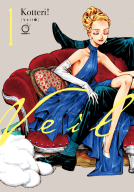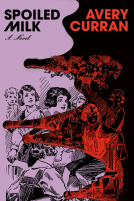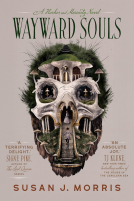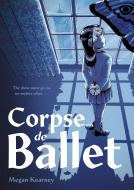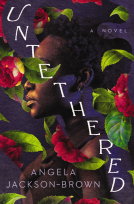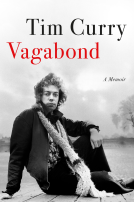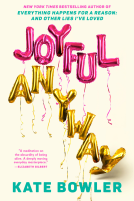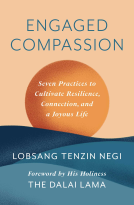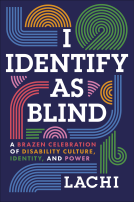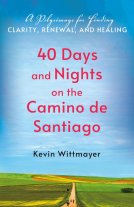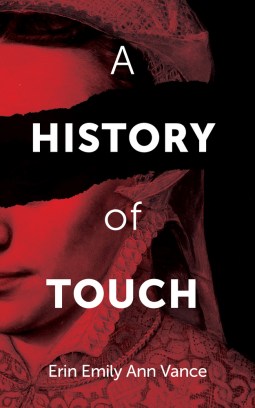
A History of Touch
by Erin Vance
This title was previously available on NetGalley and is now archived.
Send NetGalley books directly to your Kindle or Kindle app
1
To read on a Kindle or Kindle app, please add kindle@netgalley.com as an approved email address to receive files in your Amazon account. Click here for step-by-step instructions.
2
Also find your Kindle email address within your Amazon account, and enter it here.
Pub Date May 01 2022 | Archive Date Jun 30 2022
Talking about this book? Use #AHistoryofTouch #NetGalley. More hashtag tips!
Description
Bearing witness to women in history.
A History of Touching is a poetry collection about women in folklore and history who were ill, disabled, or otherwise labelled ‘hysteric.’ The work bears witness to the lives of women with varying experiences, such as a woman whose epilepsy was mistaken for demonic possession, Sarah Winchester’s grief, Mary Roff and her love of leeches, and the “witch”, Biddy Early. There is a poem about Bridget Cleary, who upon displaying her independence was burned to death by her husband, believing her to be a changeling. The collection includes pieces on anchoresses, Rosemary Kennedy, and accused witches. A History of Touching tells the stories of ‘difficult women.’ Each poem discusses an aspect of or a moment in a woman’s life, connecting these moments to different aspects of embodiment and the natural world. A History of Touching is an examination of women vilified or left behind for their strength or their weakness. This book uses strong poetic imagery and metaphor to elevate details drawn from real life to that of poetry. The book comprises of three sections, each drifting between biographical poetry (Scrying, about Biddy Early), experimental poetry (Projections of a Glass Womb, which manipulates the text of a midwifery textbook), fairy tale sequences (What a Pretty Sight), folklore, (Macha, Flickers) and pieces that incorporate elements of confessional poetry (Bloodletting, Whiskers).
Available Editions
| EDITION | Other Format |
| ISBN | 9781771837217 |
| PRICE | $17.95 (USD) |
| PAGES | 100 |
Average rating from 41 members
Featured Reviews
i have found my favourite poetry collection of ALL TIME.
oh how i am so devastated that i dont have this in my hands and that i cant viciously annotate it.
erin vance has written poetry, using language like i have never seen it wielded before, to tell the remarkable stories of different women throughout history.
but it’s not the everyday cliché stories that everyone speaks about, but the specific stories, niche historical events. and half the fun of this was researching all the little details and finding more meaning in the verses. (but worry not, the author has put a historical note at the end of the book so the hidden meanings are easy to find.)
my jaw dropped after so many of these poems. some of them i had to reread to gather the full effect. this was amazing.
this comes out may 1st PLS READ IT! thank you soso much net galley and guernica editions for this arc.
i will be thinking abt this one and missing her everyday
 Hannah S, Reviewer
Hannah S, Reviewer
I loved this poetry collection, the imagery was visceral and my favorite poems were about Sylvia Plath, Ruth Blay and one of the Radium Girls
Raw, Powerful, and often time so distrubing it's difficult to read.
I honestly don't even know how to begin this review. The body horror elements that are present in this selection of poems made it difficult for me read at times. If I had to reccomend one poem from this collection it would be "This Little World"
4/5 purely because of all the body horror.
 Joshua G, Reviewer
Joshua G, Reviewer
Erin Emily Ann Vance is the author of the novel Advice for Taxidermists and Amateur Beekeepers (Stonehouse Publishing 2019) as well as six chapbooks of poetry. She was a recipient of the Alberta Foundation for the Arts Young Artist Prize in 2017 (nominated by Aritha van Herk) and a finalist for the 2018 Alberta Magazine Awards for her short story “All the Pretty Bones.” Her fiction, poetry, and essays have appeared in magazines and journals all over the world. Her newest poetry collection is A History of Touch, which is a profound collection of poetry about women who were ill, disabled, mad, or simply too rebellious, and the fates they faced.
Vance’s collection pulls no punches. The first poem “All the Women You’ve Ever Touched” begins
You want to leave me to rot?
Fine.
Let my hair burn into copper moss
in the forest saw off chunks of my flesh.
I am not far from the window, so
lick me fat like a silkworm.
The poems only get darker from there, and the readers are all the better for the journey.
Vance is not afraid to look history directly in the eye and retell it for what it is. A major selection of these poems are dedicated or about historical figures, real women who have lived, whether they’re famous, infamous, or otherwise. For example, the poem “Crow Theory” is dedicated to Bella Wright of the infamous “Green Bicycle Case” of 1919 England. It’s a short, direct poem, but one that holds the entire legal system accountable for its actions or inactions:
The will say a crow gorged itself to death
on my blood
stumbled into a field and died from its gluttony
before they will say
that a man could have bled me dry
The themes in this poem and others like it resonate outward, calling into question the justice that women are dealt in courts up to this day. Vance uses the horror and the mythic in her poems to not just document history, but to expose how relevant it is to modern society and its ills.
Elsewhere, Vance taps into the mythic and folkloric aspects of feminist history. For example, “Flickers” deals with images of witchcraft with lines like:
The witches are mourning
this trunk. Its tumors
tremor, a century of use.
The staunch, severed leaves
black as charred meat.
Here Vance taps into ecohorror, using the folkloric as a vehicle to explore ecological concerns and how the abuse of women, well documented by this point in the book, is similar to the ecological abuse perpetrated against the earth. The depth of Vance’s poems, and the multi-layered aspects of her poetry, cannot be overstated. There is a lot happening between these covers, and readers will learn as much as they will be terrified.
A History of Touch is a tour-de-force. It’s certainly not the first collection to document women’s history in poetry or the abuse that historical women have suffered, and it’s certainly not going to be the last. However, Vance takes these well-worn themes and pushes them in new directions, shining a light where perhaps once were only shadows and cobwebs, which is what readers should expect any poet to do. These poems tackle famous subjects, to be sure, but also relatively unknown subjects as well, or subjects known only to specialized historians. Vance has delved deep into these areas and written some magnificent poems that will horrify readers with the actions people, past and present, are capable of committing against one another. Vance then steeps the collection in a heavy dose of myth and folklore, creating a web of imagery that is tight and haunting. This is an incredible collection of poetry, and horror readers will thoroughly enjoy it.
content warnings: death, abuse, miscarriage, body horror, ableism, menstruation, pregnancy, violence, sexism, misogyny
------------------------------------------
While it certainly isn’t the first or the last of it’s kind, Erin Vance shines new light on themes of motherhood, misogyny and violence against women in A History of Touch. This vivid and haunting collection of poetry is about the women history would have you forget about - the ones labeled ‘difficult’ or ‘hysterical’. With poems focusing on those women, the ones who have been mistreated simply for existing in a world that holds men above all else, this collection is immersive and thought-provoking.
Although I wasn’t familiar with many of the women mentioned in this collection of poetry, half the fun was in researching their stories and rereading the poems to connect the dots. I didn’t realize there was a reference sheet in the back of the book until I’d already finished but I’m certainly not going to complain about it. I truly enjoyed learning about these women from history that I hadn’t heard of before.
While I wish there had been a bit more warning about the contents of this book, I truly enjoyed this collection of poems and can’t wait to read more of Erin Vance’s work in the future.
A History of Touch is a lyrical hall of horrors that explores the darkness, the gore, and the painful things many women have to go through. Vance walks in the shoes of many silenced, hidden, and maligned women in history, and in each poem, she unearths their pain and screams so loudly that anyone cannot help but hear.
The first poem, All the Women You've Ever Touched, sets the stage for this Gothic horror show: mangled bodies, grotesque carnage, burning rage. It is a collective fire that pulls you in and demands you to declare where you stand because it is silence of allies that killed them all.
What makes this whole collection even more unsettling is Vance's signature mic-drop move: The last line of each poem is often an action directed to the reader--Feel them. Lick.--inducing the senses and ending with a sensation that lingers long after closing the book.
 Educator 973858
Educator 973858
I loved how the poems took historical events and folklore to give voices to women who weren’t listened to or who’s voices were taken away. I found the poems most impactful knowing who or what they were about (and had fun learning the historical context). Some are easy to look up because the names or keywords are in it or from notes in the back, but not all are and those I had more trouble understanding. I think it’s worth bookmarking the notes in the back because I didn’t read it until the end and then had moments where I went, “wait, that poem was about a banshee?” I rec this most to readers that enjoy hidden history/hearing from voices that have been ignored as well as true crime and folklore fans (and there’s likely a lot of overlap between the two).
“A History of Touch” is one of my favourite poetry collections. It’s a perfect addition to the growing number of books which give voice to voiceless women in history. As Emily Dickinson wrote: “Tell all the truth but tell it slant —“, Erin makes fresh the fates of both infamous and unknown women without holding back. The collection is 100% feminist gothic rage. Not for the faint hearted, as is the case with so many women’s lives, historical and contemporary.
A 2023 “Women’s History Month Reading Suggestion”.
A History of Touch is an intriguing anthology of eerie poetry with a nudge at the Gothic. The collection did a great job of capturing these moods and aesthetic even if there weren't many really memorable passages that are going to stay with me. Still, I think this is worth picking up and experiencing at least once. The poems' general theme and melancholic vibe appealed to me, and could reach a wider audience given the right circumstances. To be honest, I'm shocked not much has been said about this collection especially over on TikTok.
Thanks to NetGalley and Guernica Editions for providing me with an ARC of this book! All opinions are my own.
Readers who liked this book also liked:
Kotteri
Comics, Graphic Novels, Manga, General Fiction (Adult), Teens & YA
Kevin Wittmayer
Christian, Health, Mind & Body, Outdoors & Nature
